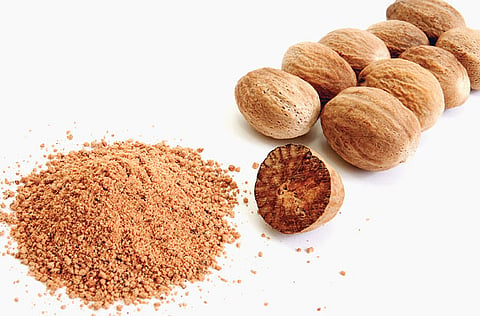Nutmeg: The story of a rare spice
The history of nutmeg is illuminating

If it wasn't for nutmeg, nobody would have heard of the Bandas, the ten islands in western Melanesia. The spice, very likely, evolved here and for centuries this was the only place it grew on.
The archipelago has, therefore, suffered an importance in disproportion to its size, fought over by European powers, since its "discovery" in the 16th century. Run, the smallest island, had the hardest time, flicking between English and Dutch control.
Nutmeg is the rarest of spices. Its woody balls are the stones or pips of fruits that plump from the nutmeg tree, Myristica fragrans. You can eat the fruit, too, if you are lucky enough to get it: in Sulawesi they sugar it, then dry it in the sun so it partially ferments. It is said to taste a bit like crystallised ginger.
Illuminating history
The history of nutmeg is illuminating. By the 6th century, the spice had reached Byzantium, 12,000 kilometres away. The Arabs traded it through the Middle Ages, funnelling it through Venice to season the tables of the European aristocracy.
It is no exaggeration to say that the hunt for nutmeg helped build the modern commercial world. In 1453, the Ottoman Turks conquered Constantinople (modern Istanbul), embargoing trade across the sole sliver of land through which a few merchants had evaded the Arab-Venetian spice monopoly and forced Europeans to find new eastern trade routes.
The Portuguese military genius Afonso de Albuquerque annexed the Indonesian Molucca islands, of which the Bandas form part, in 1511. The fortresses he built there established and then consolidated a Portuguese monopoly over the world's nutmeg.
But nutmeg was always worth fighting for. The Dutch East India Company (VOC) seized all but one of the Bandas in the early 1600s, enslaving the native occupants. In 1603, the English gained a toehold in the trade by arranging to export Run's nutmeg. The Dutch and English then fought over Run for the next 60 years. Eventually, they settled on a compromise. The English agreed to "swap" Run for a Dutch holding in the far west.
The Netherlanders enforced their nutmeg monopoly brutally, banning the export of the trees, drenching every nutmeg in lime before shipping to render it infertile, and imposing the death penalty on anyone suspected of stealing, growing or selling nutmegs elsewhere. When some Bandanese failed to appreciate the VOC's right to control the trade, then head of the company, Jan Pieterszoon Coen, ordered the beheading of every Bandanese male over the age of 15.
Breaking the Dutch monopoly
With this militarised vision of capitalism, the VOC became the richest corporation in the world. The Dutch perpetuated their nutmeg monopoly by force and pathological secrecy, never revealing to traders the islands' location.
In 1769, Pierre Poivre, a French horticulturalist, smuggled out nutmegs and nutmeg trees. The French planted the seeds on their colony Mauritius, and the Dutch monopoly was broken.
Finally, the British occupied the islands from 1796 to 1802, and were then able to grow nutmeg in Penang and Singapore and thereafter in their other possessions. The Caribbean island of Granada, a longstanding British colony, eventually became the world's second leading nutmeg exporter.
What made nutmeg so captivating, so costly, for so long? One factor was its sheer rarity. In nutmeg's history, like most spices, the Arabs traded it as scent, aphrodisiac and medicine. During the Black Death, nutmeg commanded hysterical prices because desperate people believed it might ward off plague.
Can be intoxicating
But the old apothecaries were more cautious with nutmeg than with other spices. The Salerno School decreed: "One nut is good for you, the second will do you harm, the third will kill you." That isn't strictly true but in large doses nutmeg can be intoxicating. Its oil contains myristicin: in large doses this acts as a deliriant, while causing palpitations, convulsions, nausea, dehydration and pain. It is fatal to a number of animals, including dogs.
The Dutch, who had time to get to know nutmeg, add it to most of their vegetable dishes. It is also popular in Quebec. The spice is popular in historical spheres of Moorish influence but not, oddly, in India.
In England, nutmegs are essential to the spiced foods of Christmas, to custard tarts and to the mealy, stodgy brood of national puddings. It has an affinity with cinnamon and can often take its place. It is lovely in mashed potato.
Of course, the spice is almost universally available today. Jars on supermarket shelves don't begin to hint at its past. But the story of food can sometimes be the story of humanity, and nowhere does that seem more true than in the case of nutmeg, the headiest, most alluring, most blood-soaked of the spices.
Sign up for the Daily Briefing
Get the latest news and updates straight to your inbox




